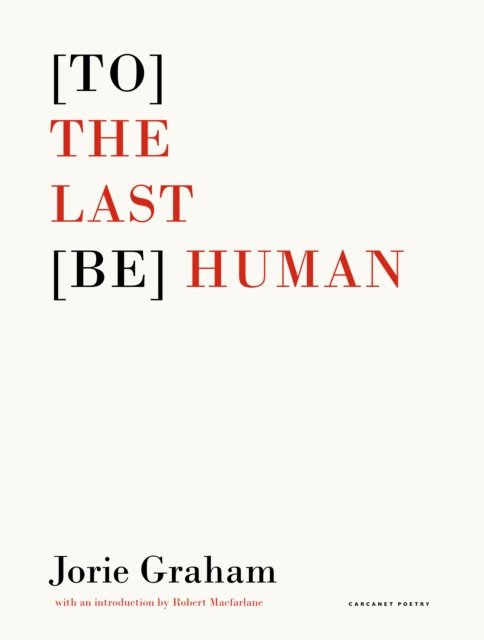Quotation: Jorie Graham

…I want nothing to
come back, not ever, & these words are mine, there is no angel to
wrestle, there is no inter-
mediary, there is something I must
tell you, you do not need existence
– Jorie Graham, [TO] THE LAST [BE] HUMAN
Never a book so full of quotable lines, yet so hard to extract from. Context is everything and even this attempt to isolate a soundbite feels like it stands too far from the rest of the poem’s context.
Which is to say, this is a poetry that accrues power through its sustained engagement with Graham’s burgeoning climate consciousness (or, perhaps, terror, despair) across two decades.
It is, without a doubt, one of the hardest, most important books of poetry I have encountered. Compared to those other ‘difficult’ poets I’ve read (or tried to read), Geoffrey Hill is tame by comparison. His thesis is clear to me, even when he’s mucking about with scatological ribbing or describing Trinculo-style pratfalls all the way to hell. JH Prynne, or John Ashbery, to me seems relatively clear in their incomprehensibility, correlating their engagement with an aesthetic difficulty with some kind of assertion of / fear of (fascistic, Marxist-Stalinist) totality.
Yes, yes, all reductive claims by me, based on the idea no one reads this blog but me. But to Graham’s poetry. The work here offers an emotional difficulty, yet with all the charge, complexity (democracy, cf. Hill’s ‘difficult art is the most democratic’) of interpretation and a staging of the ‘real’ that makes her poetry feel more equal to to our contemporary climatic crisis than the other ecopoetry I’ve seen marketed in English (and some other languages, but I don’t claim my ‘I’ve seen’ to be anything but the limited subjective range of a grump like me).
The quotation I lifted focuses on that part of the book’s voice-driven energy I find most moving. This is so personal, yet so shared, leaping from specific experience to something I had not voiced for myself yet. Knowing we are going extinct, knowing existence and the philosophical debate around thinking therefore am-ing, what right do I have to despair the end of life on this planet? The end of human self-reflection, self-awareness?
Is Graham’s poem an attempt at consolation? At self-negation? At a kind of Buddhist contentment through letting go?
What do I want, knowing there is no more an intermediary between me and annihilation of everything I’ve cared about? How do I feel, knowing there are no more prayers left to us, let alone no divinity to save or salve this material oblivion we face?
I’ve met a few physicists and philosophers in my time who talk about the absolute heat death of the universe as if it’s evidence of all (or the only) objective truth we ever need know. Yet it’s bandied about like a fact in the present, despite the sheer, incomprehensible scale of deep time between us and that moment, used as a playing card to trump arguments about meaning and meaningless in this existence and, ironically, starts to feel like yet another patriarchal whipping stick. Such concepts are meaningless. Against the fact. Of our failure to survive even a paltry twenty millennia towards the curtain fall of energy in the cosmos.
That, there, is the real challenge, the real difficulty in Graham’s poetry. She helps me to reconcile myself to a sense of failure at the level of our species.
(Also, it’s quite hard to recreate her poetry on the internet, lots of weird formatting to contend with. Like Geoff Hill might have said, we may as well enjoy what’s left, right?)


